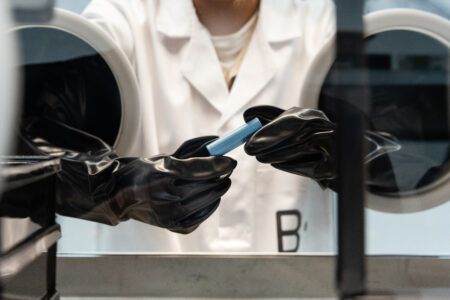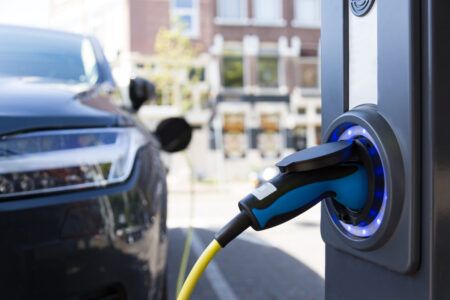A £130m state-of-the-art UK Battery Industrialisation Centre (UKBIC) has been officially opened, which will be key in developing battery technologies for future electrification.
UK Prime Minister Boris Johnson formally opened the pioneering 18,500 square meter national battery manufacturing development facility based in Coventry, in the West Midlands, which will offer equipment for the entire battery production process for any company to use.
As well as supporting battery technology innovation, the national facility will support the UK’s ambitious climate change targets, which includes achieving ‘net zero’ carbon emissions by 2050 and, for the automotive sector, an end to the sale of petrol and diesel cars and vans by 2030.
UKBIC can be used by any organization working on batteries for electric vehicles, rail, aerospace, industrial and domestic equipment and static energy storage, who can benefit from finding out whether their advanced technologies can be scaled up successfully before committing to the huge investment required for mass production. The facility employs more than 80 battery technicians, engineers, and support staff, with plans for that number to grow to support future project partnerships with industry and research organizations.
Speaking during his visit, The Rt Hon Boris Johnson MP, Prime Minister, said: “UKBIC is a beacon of innovation and ingenuity- shining the way for a brighter, greener future for the battery sector in the UK. It was an honor to open this world-class facility today and I cannot think of a more fitting backdrop here in Coventry to speak about the government’s ambitious agenda to level up across the UK.
“This facility will help to deliver green growth and jobs as industrial demand accelerates in the UK battery sector. With the technology and government-backed expertise on offer right here in Coventry, I have no doubt that UKBIC will become world leaders in the industry.”
Jeff Pratt, UKBIC’s Managing Director, added: “I’m delighted that UKBIC is open for business. Completed at deliberate speed during the pandemic, UKBIC is a key part of the UK Government’s Faraday Battery Challenge, created to fast track the commercialization of cost-effective, high-performance, durable, safe, low-weight and recyclable batteries.
“The battery manufacturing equipment installed covers the whole production process from electrode manufacturing, cylindrical and pouch cell assembly, to formation aging and testing and battery modules and packs. The facility is also a training center to upskill the UK battery sector.
“The importance of the battery sector to the UK economy cannot be underestimated. The Faraday Institution believes that the equivalent of seven large gigafactories will be needed in the UK and employment in the automotive industry and battery supply chain could grow from 170,000 to 220,000 by 2040.
“As we all look to recover from the impact of Coronavirus, we have the opportunity to help make the UK a global leader in batteries, with UKBIC and the Faraday Institution supporting the UK battery industry to become world leaders.”
In addition to funding from the Faraday Battery Challenge through UK Research and Innovation, UKBIC is also part-funded through the West Midlands Combined Authority. The project has been delivered through a consortium of Coventry City Council, Coventry and Warwickshire Local Enterprise Partnership and WMG, at the University of Warwick. UKBIC was created in 2018 following a competition led by the Advanced Propulsion Centre with support from Innovate UK.
Partners involved with the facility commented:
Tony Harper, Faraday Battery Challenges challenge director: “This complex state of the art facility has been delivered at least two years ahead of its nearest international rival will help ensure the UK fully prospers from the transition to electric vehicles.”
David Greenwood, professor of advanced propulsion systems, WMG at the University of Warwick: “Battery production is critical to the future of the UK automotive sector, the electrification agenda, and achieving a sustainable future for industry. It is something that WMG identified back in 2016, and we were elated to win the bid to establish what is now UKBIC. At the heart of the UK battery manufacturing landscape, this national infrastructure exists nowhere else in Europe, and gives the UK a major advantage for development of new battery technologies. Together, we have built an ecosystem which allows battery companies to investigate new technologies, prove them out, then industrialize for high volume manufacture.”
Ian Constance, CEO of the Advanced Propulsion Centre: “There’s billions of pounds of opportunity in the UK to manufacture the low-carbon technology needed by the automotive and clean-tech sectors. Recent announcements by Nissan and Stellantis to expand their electric vehicle operations here demonstrate the UK’s globally recognized expertise and capability in clean innovation. We are continuing to build on the work we’ve already done to accelerate the UK’s low-carbon ambitions, which will lead to even more jobs and lower carbon dioxide emissions.”





